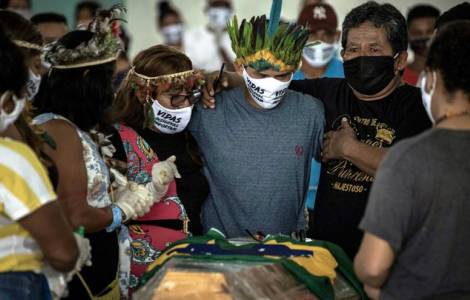
Brasilia (Agenzia Fides) - "These vetoes are ethically indefensible and inhuman, as they deny the fundamental guarantees for the lives of indigenous peoples", reads the document signed by Mgr. Walmor Azevedo de Oliveira, president of the National Conference of Bishops of Brazil ( CNBB) sent to Fides. President Bolsonaro has issued 16 vetoes claiming that he is not able to fully approve the law because it would force him to use resources that are not foreseen in the budget (see Fides, 10/7/2020).
According to the Bishops of Brazil, the president's argument is fallacious, since Congress has already voted for a constitutional amendment on the "war budget", due to the crisis triggered by the coronavirus, which allows to exceed the expected expenses voted before the pandemic. The Catholic Church has asked the legislative power to take a "strong, decisive and definitive position in favor of life" which results in the lifting of the president's vetoes.
The CNBB published an "Open Letter to the National Congress" on Monday 13 July to appeal for the defense of the rights of indigenous and traditional peoples. The Bishops react with "indignation and repudiation" to the 16 presidential vetoes, which they consider "ethically unjustified and inhuman", because they affect "fundamental rights and guarantees" for the life of traditional populations, such as access to safe drinking water.
The CNBB Episcopal Commission for the Amazon and the Pan-Amazonian Ecclesial Network (Repam) also contested the decision of Jair Bolsonaro, considering that it is a "life or death problem" in cities, villages and urban suburbs, where the virus has already arrived.
The Indigenous Missionary Council (CIMI) stresses that the presidential vetoes "reiterate the prejudice, hatred and violence of the current government in relation to indigenous peoples, quilombola and traditional populations" (see Fides, 10/7/2020). (CE) (Agenzia Fides, 15/7/2020)